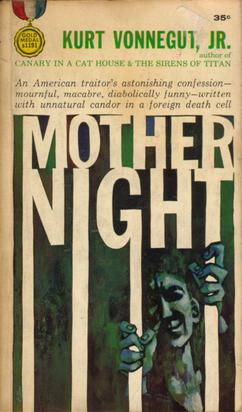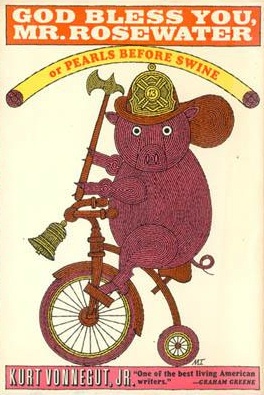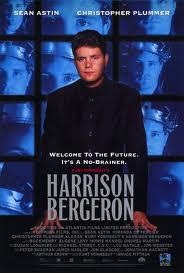
Kurt Vonnegut was an American writer and humorist known for his satirical and darkly humorous novels. In a career spanning over 50 years, he published fourteen novels, three short-story collections, five plays, and five nonfiction works; further collections have been published after his death.

Cat's Cradle is a satirical postmodern novel, with science fiction elements, by American writer Kurt Vonnegut. Vonnegut's fourth novel, it was first published in 1963, exploring and satirizing issues of science, technology, the purpose of religion, and the arms race, often through the use of morbid humor.

Slaughterhouse-Five, or, The Children's Crusade: A Duty-Dance with Death is a 1969 semi-autobiographic science fiction-infused anti-war novel by Kurt Vonnegut. It follows the life and experiences of Billy Pilgrim, from his early years, to his time as an American soldier and chaplain's assistant during World War II, to the post-war years, with Billy occasionally traveling through time. The text centers on Billy's capture by the German Army and his survival of the Allied firebombing of Dresden as a prisoner of war, an experience which Vonnegut himself lived through as an American serviceman. The work has been called an example of "unmatched moral clarity" and "one of the most enduring anti-war novels of all time".
"Harrison Bergeron" is a satirical dystopian science-fiction short story by American writer Kurt Vonnegut, first published in October 1961. Originally published in The Magazine of Fantasy and Science Fiction, the story was republished in the author's Welcome to the Monkey House collection in 1968.

Breakfast of Champions, or Goodbye Blue Monday is a 1973 novel by the American author Kurt Vonnegut. His seventh novel, it is set predominantly in the fictional town of Midland City, Ohio, and focuses on two characters: Dwayne Hoover, a Midland resident, Pontiac dealer and affluent figure in the city, and Kilgore Trout, a widely published but mostly unknown science fiction author. Breakfast of Champions deals with themes of free will, suicide, and race relations, among others. The novel is full of drawings by the author, substituting descriptive language with depictions requiring no translation.

Mother Night is a novel by American author Kurt Vonnegut, first published in February 1962.

The Sirens of Titan is a comic science fiction novel by Kurt Vonnegut Jr., first published in 1959. His second novel, it involves issues of free will, omniscience, and the overall purpose of human history. Much of the story revolves around a Martian invasion of Earth.

Player Piano is the first novel by American writer Kurt Vonnegut Jr., published in 1952. The novel depicts a dystopia of automation partly inspired by the author's time working at General Electric, describing the negative impact technology can have on quality of life. The story takes place in a near-future society that is almost totally mechanized, eliminating the need for human laborers. The widespread mechanization creates conflict between the wealthy upper class, the engineers and managers, who keep society running, and the lower class, whose skills and purpose in society have been replaced by machines. The book uses irony and sentimentality, which were to become hallmarks developed further in Vonnegut's later works.

God Bless You, Mr. Rosewater, or Pearls Before Swine, Kurt Vonnegut's fifth novel, was published in 1965 by Holt, Rinehart and Winston and as a Dell mass-market paperback in 1970. A piece of postmodern satire, it gave context to Vonnegut's following novel, Slaughterhouse-Five and shared in its success.

Welcome to the Monkey House is a collection of 25 short stories written by Kurt Vonnegut, published by Delacorte in August 1968. The stories range from wartime epics to futuristic thrillers, given with satire and Vonnegut's unique edge. The stories are often intertwined and convey the same underlying messages on human nature and mid-twentieth century society.
Kilgore Trout is a fictional character created by author Kurt Vonnegut. Trout is a notably unsuccessful author of paperback science fiction novels.

Galápagos (1985) is the eleventh novel published by American author Kurt Vonnegut. Set in the Galápagos Islands after a global financial disaster, the novel questions the merit of the human brain from an evolutionary perspective. The title is both a reference to the islands on which part of the story plays out, and a tribute to Charles Darwin, on whose theory Vonnegut relies to reach his own conclusions. It was published by Delacorte Press.
Bernard Vonnegut was an American atmospheric scientist credited with discovering that silver iodide could be used effectively in cloud seeding to produce snow and rain. He was the older brother of American novelist Kurt Vonnegut.
The RAMJAC Corporation is a fictional multinational conglomerate, or megacorp, featured in several novels by Kurt Vonnegut. In Vonnegut's 1979 novel, Jailbird, the company at its height owns 19 percent of the United States, twice as large as the next largest conglomerate in the "Free World". Copyrights on Vonnegut's later books are also held by RAMJAC, much like Isaac Asimov's later copyrights are held by Nightfall, Inc.
"All the King's Horses" is a short story written in or before 1951 by Kurt Vonnegut. It can be found in his collection of short stories Welcome to the Monkey House. It derives its title from a line in the Humpty Dumpty nursery rhyme.

Canary in a Cat House is a collection of twelve short stories by American writer Kurt Vonnegut, published in 1961. Eleven of the twelve appear in the later collection Welcome to the Monkey House, with "Hal Irwin's Magic Lamp" being omitted. In a later collection of short stories, Bagombo Snuff Box, there is a story with that title although it is a different version.
Bill Dedman is a Pulitzer Prize-winning American investigative reporter and co-author of the biography of reclusive heiress Huguette Clark, Empty Mansions: The Mysterious Life of Huguette Clark and the Spending of a Great American Fortune.

Harrison Bergeron is a 1995 cable science fiction television movie film loosely adapted from Kurt Vonnegut's 1961 dystopian short story of the same name. It was produced for Showtime and first screened on August 13, 1995. It was released to VHS in 1998.
Nonconformity: Writing on Writing is a book-length essay by Nelson Algren, intended for publication in 1953 but released posthumously in 1996 by Seven Stories Press. Kurt Vonnegut called it, "A handbook for tough, truth-telling outsiders who are proud, as was Algren, to damn well stay that way."

Haunt is an American comic book published by Image Comics. Created by Todd McFarlane and Robert Kirkman, the series debuted in October 2009 and ended in December 2012 after 28 issues. The comic was originally written by Kirkman with pencils by Ryan Ottley, layouts by Greg Capullo, and inks by McFarlane, to a mixed to positive critical reception. Joe Casey and Nathan Fox took over as the book's creative team as of Haunt #19 to a universally negative reception, abandoning the original storyline and supporting cast and serving as a tie-in to the pair's Spawn series, in which Haunt is featured as a supporting character.











